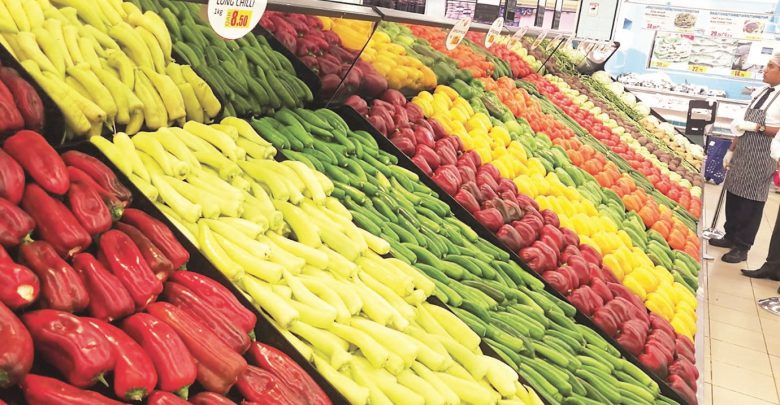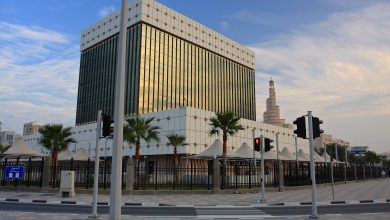
Local agricultural production witnesses significant growth
زيادات كبيرة في نسب الاكتفاء الذاتي من المنتجات الزراعية
QNA
The Director of Food Security Department at the Ministry of Municipality and Environment (MME) Masoud Jarallah Al Marri, said that the local production of all agricultural products has achieved a significant increase in the framework of the efforts to achieve self-sufficiency and food security in the country.
Al Marri said that the self-sufficiency rate of dairy products in Qatar is currently 106 percent, poultry 124 percent, fresh vegetables 27 percent, table eggs 28 percent and red meat 18 percent.
Livestock also had increases in growth rates, the largest being cattle numbers of around 34 percent, he said. He pointed out that the total number of livestock currently in Qatar is about 1.6 million one heads including 1,000,073 sheep, 429,664 goats, 40,857 cows and 128,798 camels.
In this regard, Al Marri talked about the significant increase in marketing programs for local vegetables of the Ministry of Municipality and Environment, reaching 78 tonnes in August 2019 compared to 35 tonnes in August 2018.
Al Marri was speaking at the opening session of a workshop ‘a series of training courses’ organized by the Ministry of Municipality and Environment (MME) for a number of researchers and employees of the Somali Ministry of Agriculture, started yesterday and will continue until September 26.
The Director of the Agricultural Research Department at the Ministry of Municipality and Environment Hamad Saket Al Shammari, said that the State of Qatar has spared no effort in supporting, participating and receiving various activities that promote agriculture in the Arab world.
Al Shammari said that the participants from Somalia will be briefed on the latest findings on plant and animal research in Qatar and how to implement modern methods in agriculture, to achieve national food security, and thus provide the economy with an important social and economic resource.
He expressed his hope that these courses would achieve the maximum benefit in terms of exchanging information and experiences between participants and experts of Qatar in the sector of agriculture. Al Shammari said to reporters that these training courses aim to develop the capabilities of Somali engineers, experts and researchers in the sectors covered, such as vegetable production, palm tree care, crop conservation, post-harvest operations, livestock development and protection from communicable and transmitted diseases.
Participants will be briefed on the experiences of Qatar in these fields, which include the techniques of palm cultivation and pollination with liquid instead of traditional pollination operations, in addition to modern irrigation techniques, date drying and other new methods in the field, he said.
He stressed that the State of Qatar has achieved great successes in the field of irrigation techniques under the soil and modern fertilization methods and the process of drying dates, revealing that the production of tomatoes will soon be launched in 3 greenhouses in order to grow tomato types able to adapt to environmental conditions in Qatar.
The Director of the Agricultural Research Department pointed out that, in the field of livestock research the department is in the process of preparing a ‘Nucleus Herd’ in Qatar during which the focus will be on vaccinating of livestock in different environmental conditions in order to know the impact of weather conditions and high temperatures on livestock production in the country.
أكد السيد مسعود جار الله المري مدير إدارة الأمن الغذائي بوزارة البلدية والبيئة، أن الإنتاج المحلي لجميع المنتجات الزراعية حقق زيادة كبيرة، في إطار الجهود المبذولة لتحقيق الاكتفاء الذاتي والأمن الغذائي بالدولة.
وكشف المري في تصريح، أمس، لوكالة الأنباء القطرية (قنا) عن أن نسبة الاكتفاء الذاتي من الألبان ومشتقاتها في قطر تبلغ في الوقت الحالي 106%، ومن الدواجن 124%، ومن الخضراوات الطازجة 27%، ومن بيض المائدة 28%، ومن اللحوم الحمراء 18%.
وقال إن الثروة الحيوانية حققت كذلك زيادات في معدلات النمو، وكان أكبرها في أعداد الأبقار بنسبة تبلغ حوالي 34%.
ونوه بأن إجمالي أعداد الثروة الحيوانية حالياً في قطر يبلغ حوالي مليون و600 ألف رأس، منها مليون و73 رأساً من الأغنام و429.664 من الماعز، و40.857 رأساً من الأبقار، و128.789 رأساً من الإبل.
كما تطرق المري، في هذا الصدد، لما حققته البرامج التسويقية للخضراوات المحلية لوزارة البلدية والبيئة من زيادات كبيرة، حيث وصلت إلى حوالي 78 طناً خلال شهر أغسطس 2019 مقارنة بنحو 35 طناً لشهر أغسطس 2018.



